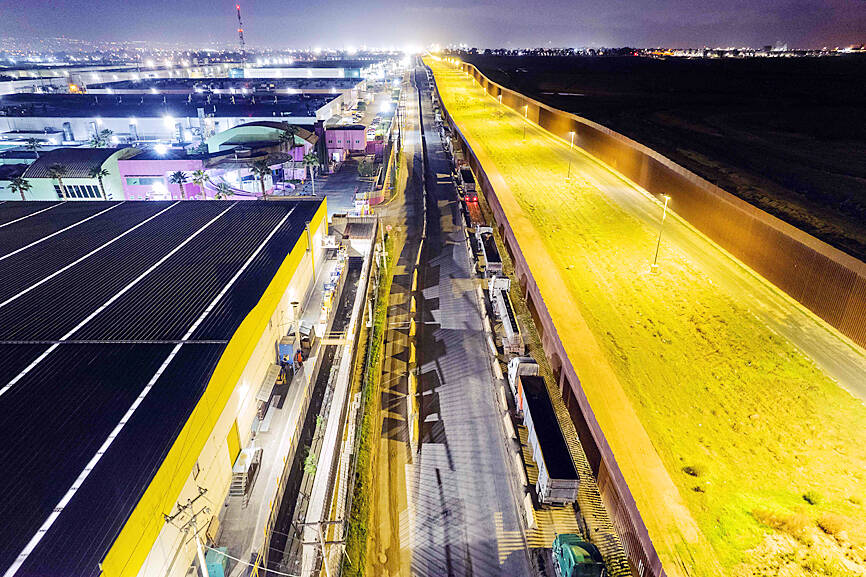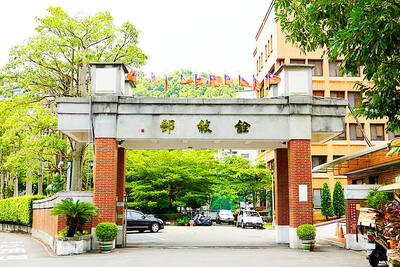Mounting trade wars between the US and its largest economic partners yesterday deepened as US tariffs on Canada, Mexico and China took effect, sparking swift retaliation from Beijing and Ottawa.
Stinging US tariffs on Canadian and Mexican goods came into effect as a deadline to avert US President Donald Trump’s levies passed without the nations striking a deal — a move set to snarl supply chains.
Trade war fears sent markets falling in Asia and Europe in response to what analysts said were its steepest tariffs on imports since the 1940s.

Photo: AFP
Trump had announced — and then paused — the blanket 25 percent tariffs on imports from major trading partners Canada and Mexico last month, accusing them of failing to stop illegal immigration and drug trafficking.
In pushing ahead with the duties, Trump cited a lack of progress in tackling the flow of drugs like fentanyl into the US.
The duties stand to impact more than US$918 billion of US imports from both countries.
The sweeping duties on Canada and Mexico are set to hamper supply chains for key sectors like automobiles and construction materials, risking cost increases to households.
Mexico supplied 63 percent of US vegetable imports and nearly half of US fruit and nut imports in 2023, US Department of Agriculture data showed..
Truck drivers at the Otay Mesa border crossing in Mexico said they were already feeling the impact of the tariffs as they lined up to cross into the US yesterday morning.
Work was drying up, because many companies in the Mexican border city of Tijuana export Chinese goods, driver Angel Cervantes said.
“And since the tariffs are also against China, work is going down for the [transport] companies,” he added.
The US also imports construction materials from Canada, meaning tariffs could drive up housing costs.
More than 70 percent of imports of two key materials homebuilders need — softwood lumber and gypsum — come from Canada and Mexico, National Association of Home Builders chairman Carl Harris said.
Trump on Monday also inked an order to increase a previously imposed 10 percent tariff on China to 20 percent — piling atop existing levies on various Chinese goods.
Beijing condemned the “unilateral imposition of tariffs by the US” and swiftly retaliated, saying it would impose 10 and 15 percent levies on a range of agricultural imports from the US.
China’s tariffs are to take effect next week and would impact tens of billions of US dollars in imports, from soybeans to chickens.
The Chinese Ministry of Foreign Affairs vowed to fight a US trade war to the “bitter end.”
“The Chinese people will not be intimidated,” ministry spokesman Lin Jian (林劍) said.
Canadian Prime Minister Justin Trudeau on Monday pledged to impose retaliatory 25 percent tariffs on Washington, saying in a statement: “Canada will not let this unjustified decision go unanswered.”
Mexican President Claudia Sheinbaum said her country has contingency plans.

Taiwan Semiconductor Manufacturing Co (TSMC, 台積電) is expected to start construction of its 1.4-nanometer chip manufacturing facilities at the Central Taiwan Science Park (CTSP, 中部科學園區) as early as October, the Chinese-language Liberty Times (the Taipei Times’ sister newspaper) reported yesterday, citing the park administration. TSMC acquired land for the second phase of the park’s expansion in Taichung in June. Large cement, construction and facility engineering companies in central Taiwan have reportedly been receiving bids for TSMC-related projects, the report said. Supply-chain firms estimated that the business opportunities for engineering, equipment and materials supply, and back-end packaging and testing could reach as high as

CHAMPIONS: President Lai congratulated the players’ outstanding performance, cheering them for marking a new milestone in the nation’s baseball history Taiwan on Sunday won their first Little League Baseball World Series (LLBWS) title in 29 years, as Taipei’s Dong Yuan Elementary School defeated a team from Las Vegas 7-0 in the championship game in South Williamsport, Pennsylvania. It was Taiwan’s first championship in the annual tournament since 1996, ending a nearly three-decade drought. “It has been a very long time ... and we finally made it,” Taiwan manager Lai Min-nan (賴敏男) said after the game. Lai said he last managed a Dong Yuan team in at the South Williamsport in 2015, when they were eliminated after four games. “There is

Democratic nations should refrain from attending China’s upcoming large-scale military parade, which Beijing could use to sow discord among democracies, Mainland Affairs Council Deputy Minister Shen You-chung (沈有忠) said. China is scheduled to stage the parade on Wednesday next week to mark the 80th anniversary of Japan’s surrender in World War II. The event is expected to mobilize tens of thousands of participants and prominently showcase China’s military hardware. Speaking at a symposium in Taichung on Thursday, Shen said that Chinese Minister of Foreign Affairs Wang Yi (王毅) recently met with Indian Prime Minister Narendra Modi during a visit to New Delhi.

FINANCES: The KMT plan to halt pension cuts could bankrupt the pension fund years earlier, undermining intergenerational fairness, a Ministry of Civil Service report said The Chinese Nationalist Party (KMT) caucus’ proposal to amend the law to halt pension cuts for civil servants, teachers and military personnel could accelerate the depletion of the Public Service Pension Fund by four to five years, a Ministry of Civil Service report said. Legislative Speaker Han Kuo-yu (韓國瑜) on Aug. 14 said that the Act Governing Civil Servants’ Retirement, Discharge and Pensions (公務人員退休資遣撫卹法) should be amended, adding that changes could begin as soon as after Saturday’s recall and referendum. In a written report to the Legislative Yuan, the ministry said that the fund already faces a severe imbalance between revenue